See All
See All
See All
Fuel Ox® with Combustion Catalyst
$24.99 – $432
Select options
This product has multiple variants. The options may be chosen on the product page
Fuel Ox® with Combustion Catalyst additive is a unique, proprietary fuel treatment unlike any other product on the market. Our combustion catalyst fuel additive enhances stability and offers powerful dispersant-detergent capabilities, making it essential for addressing core problems found in any middle distillate fuel - whether it is gas, diesel, or HFO. It also contains a maintenance level biocide to keep bacteria from growing in your tanks.
Benefits:
- Better fuel efficiency
- Reduced emissions
- 50%+ less regenerations needed
- EGR Coolers and valves and all sensors stay cleaner
- Injectors last longer
- Less downtime & parts replacement due to emissions system failures
- Overall reduction in maintenance costs
- Reduced DEF usage of 15-20%
- No bacteria growing in your tanks
Fuel Ox® Cold Charge
$38.99 – $432
Select options
This product has multiple variants. The options may be chosen on the product page
Fuel Ox® Cold Charge additive is a unique, proprietary cold pour point fuel treatment. It is designed to improve vehicle performance and extend engine longevity. The enhanced stability and dispersant/detergent features make it indispensable in dealing with problem fuels or fuels in storage. The enhanced cold pour point stability and lubrication features make it indispensable in dealing with problem fuels at lower temperatures.
Fuel Ox® Cold Charge works in any combustible engine including automobiles, trucks, off-road vehicles, heavy equipment, trains, and ships. Thorough testing and application has proven this additive to be compatible and 100% soluble with all types of middle distillate and heavy fuel oils.
Fuel Ox® Star Plus™
$16.50 – $100
Select options
This product has multiple variants. The options may be chosen on the product page
Fuel Ox® Star Plus™ is designed to improve the efficiency of the fuel systems and greatly reduce common fuel related issues and service calls during the winter months. This includes stabilization, gelled fuel and ice, sludge buildup, water, and corrosion. Bio-blend fuels degrade more quickly and gum up the interior components of fuel systems. Oxidation of fuel creates an acidic environment causing deterioration of seals and the gumming up of interior components Fuel Ox® Star Plus™ prevents the oxidation of fuel and keeps bio-blends stable. Fuel Ox® Star Plus™ can be used in both indoor and outdoor heating oil tanks.
Infinity Lube™ Super Grease
$20.93 – $1,726.20
Select options
This product has multiple variants. The options may be chosen on the product page
Fuel Ox® Infinity Lube™ Super Grease fortified with Infinity Lube™ concentrate technology allows for an improved performance for both light and heavy duty applications. This Super Grease provides sustainability many times more than all competition. It exceeds the demands of high loads, temperatures and extreme and rugged conditions in wet and dirty environments.
Fuel Ox® Infinity Lube™ Super Grease provides the highest pressure protection at all speeds, ensures excellent thermal stability that resists oxidation and oil separation at high temperatures, and ensures the highest levels of water resistance and corrosion to protect against water wash out.
Fuel Ox® Infinity Lube™ Super Grease metal conditioning formulation reduces friction wear by conditioning, strengthening, and smoothing the two rubbing metallic surfaces on a micron level. Fuel Ox® Infinity Lube™ Super Grease's formula improves the surface of metal and provides continuous lubrication to prevent friction wear.



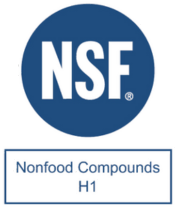
Fuel Ox® Star Plus™ Bio
$19.99 – $375
Select options
This product has multiple variants. The options may be chosen on the product page
Fuel Ox® Star Plus™ Bio is a heating oil additive for both outside and inside tanks designed specifically for B-20 blends and higher. It is made to enhance fuel system efficiency and significantly minimize prevalent fuel-related problems and service calls in the winter season. One of its primary purposes is to lower the Cold Filter Plugging Point (CFPP) well beyond any existing heating oil additive. Beyond that it also effectively addresses concerns such as stabilization, icing, sludge buildup, water contamination, microbial growth and corrosion. Bio-blend fuels have a tendency to degrade rapidly and cause blockages in the internal components of fuel systems. Fuel oxidation leads to an acidic environment that deteriorates seals and results in seal failure and the clogging of interior components. By preventing fuel oxidation and maintaining the stability of bio-blends, Fuel Ox® Star Plus™ Bio safeguards against these issues. It is great for use in both indoor and outdoor heating oil tanks.

 Fuel Terminals & Stations
Fuel Terminals & Stations
 Heavy Machinery
Heavy Machinery
 Marine
Marine
 Mining
Mining
 Municipalities
Municipalities
 Transportation
Transportation
 Trucking
Trucking
 Expulsion/Regeneration
Expulsion/Regeneration
 Fuel Contaminants
Fuel Contaminants
 Fuel Instability
Fuel Instability
 Low Fuel Efficiency
Low Fuel Efficiency
 Maintenance & Repairs
Maintenance & Repairs
 Sludge Buildup
Sludge Buildup
 Water/Condensation
Water/Condensation
 Metal to Metal Seizure
Metal to Metal Seizure
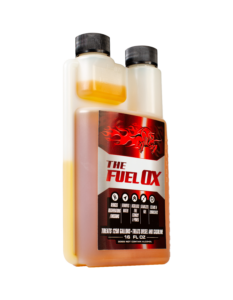
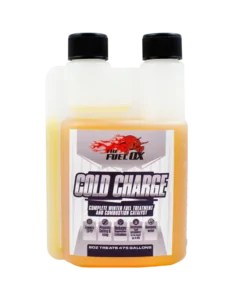
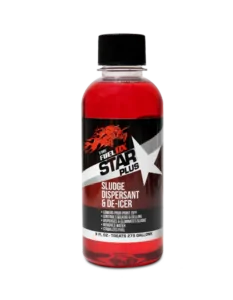
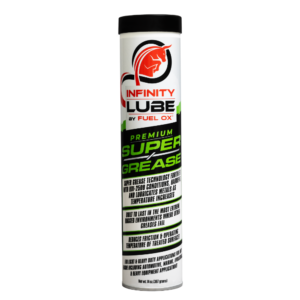
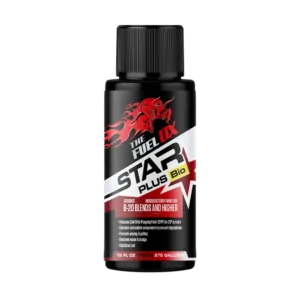

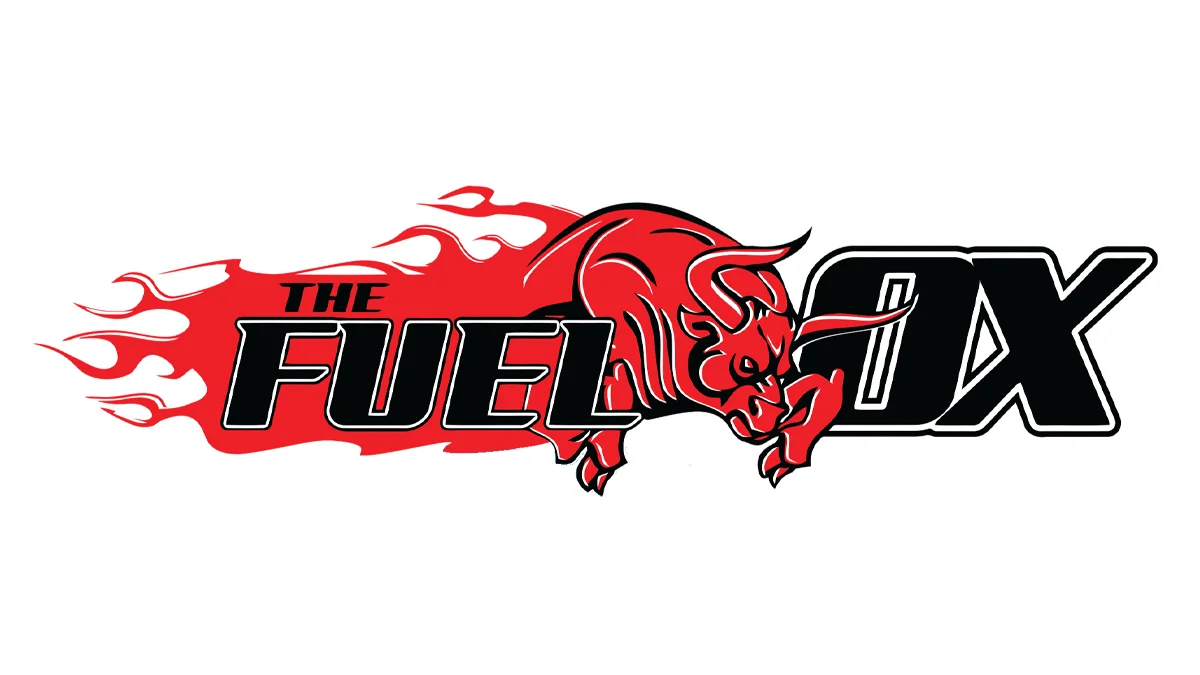
Hi,
I see the shelf life when added to the fuel is 2 years, what is the shelf life in the bottle?
thanks.
Hi Mike,
The shelf life for Fuel Ox is about 5 years.
Let us know if you have anymore questions!
I picked up a bottle at the NY boat show and will begin using it this season. It will be easy to add to my diesel tanks in the right amount. My question is that I would also like to treat the gas that I use for my small dinghy outboard. How would I get the right amount into a 1 gal portable tank for instance? Is it a problem if I use too much?
Hi Bob,
Thanks for reaching out! What size bottle did you pick up? Over treating won’t hurt anything: you’ll just be wasting some product.
Let me know if I can help you any further!
Jessica
What does it do to moisture in the gas tank
Dose it mix with water to burn it or dose it separate the water and leave it on the bottom of the tank or the top ?
Thanks in advance
Hi Mike,
Fuel Ox™ is a demusifier for water, so we filter it out to the bottom rather than burn it.
Let me know if you have anymore questions!
Thanks!
I have a 115 go Yamaha outboard and use Yamaha ring free additive in my gas can I use fuel ox with the ring free?? And will using your product affect my warranty? Thank you
Hi Robert,
If you use Fuel Ox, it will ultimately replace your ring free as it will also clean out the carbon build-up in your engine. However, if you feel more comfortable using both Fuel Ox and Ring Free, they are compatible and won’t have any adverse reactions if they are used together. Fuel Ox will not affect your warranty either!
Let us know if you have anymore questions!
Tank 3
Hi Jessica, so when you say you filter out the water to the bottom instead of burning it, what does that really mean? Sounds to me like all the water goes to the bottom of the tank? Please let me know as I would really like to try your product in our boat this upcoming season.
Hi Jessica, so when you say you filter out the water to the bottom instead of burning it, what does that really mean? Sounds to me like all the water goes to the bottom of the tank? Please let me know as I would really like to try your product in our boat this upcoming season.
Hi Patrick,
Great question! So the majority of the water found suspended in your fuel will be forced out through you water separators. Fuel Ox™ forces the remainder (the very minuscule amount) of water through your separators, or filters as well. You may have to manually remove the water from your filters. However, it is still a safer alternative compared to burning the water (emulsification) and how it can cause significant damage to your injectors. Our YouTube channel consists of over 100+ testimonials — mostly from boat shows and those who use it on their own personal boat. A lot of the testimonials mention that water is no longer an issue for them! You can check out those testimonials by clicking here
Let me know if that answers your question! Should you have anymore questions or need anything else at all, please feel free to reach out at info@fuelox.com.
Is fuel ox FAA approved for aviation in a certified aircraft?
Hi Gerald,
Great question! Although Fuel Ox does work in aviation fuel, it is not yet approved by the FAA.
Let us know if we can help you any further!
Where can I buy your product, I would like a list of dealers where I can pick it up.
Tks
Hi Jules,
You can find a list of our dealers here. If you have anymore questions, please feel free to call us directly at 1.844.8.FUELOX
Thanks!
Will this work with 10 percent ethanol ?
Hi Bob,
Yes, Fuel Ox® will work with 10% ethanol blended gasoline.
Let us know if you have anymore questions!
I have a 1983 Merc 115hp, 2 stroke. Can Fuel Ox be used in an old 2 stroke outboard.?
Hi Joe,
Thanks for your inquiry. Yes fuel ox can be used in any 2 stroke equipment. Feel free to call me if you have any other questions.
Thanks,
The Fuel Ox Team
1.844.8.FUELOX
Hello, so if I use this product due to the scarcity of finding non-ethanol gas I can go to any gas station and use regular gas for my Yamaha outboard? If so how often do you recommend changing the water fuel separator using this product?
Does fuel ox increase the shelf life of fuel?
Hi Greg,
Thanks for reaching out! Yes, Fuel OX increases the shelf life of fuel. We have stabilizers in our formula to prevent fuel from degrading for up to two years.
Let us know if you have any other questions!
If I have some seafoam in my boat gas tank can I put fuel ox in there
Hi Tim,
Yes, Fuel Ox is compatible with Seafoam if it’s already in your tank! It will not cause any harm to your engine.
Please let me know if you have anymore questions!
I purchased fuelox at a discounted rate at saltwater show,can I get that again?